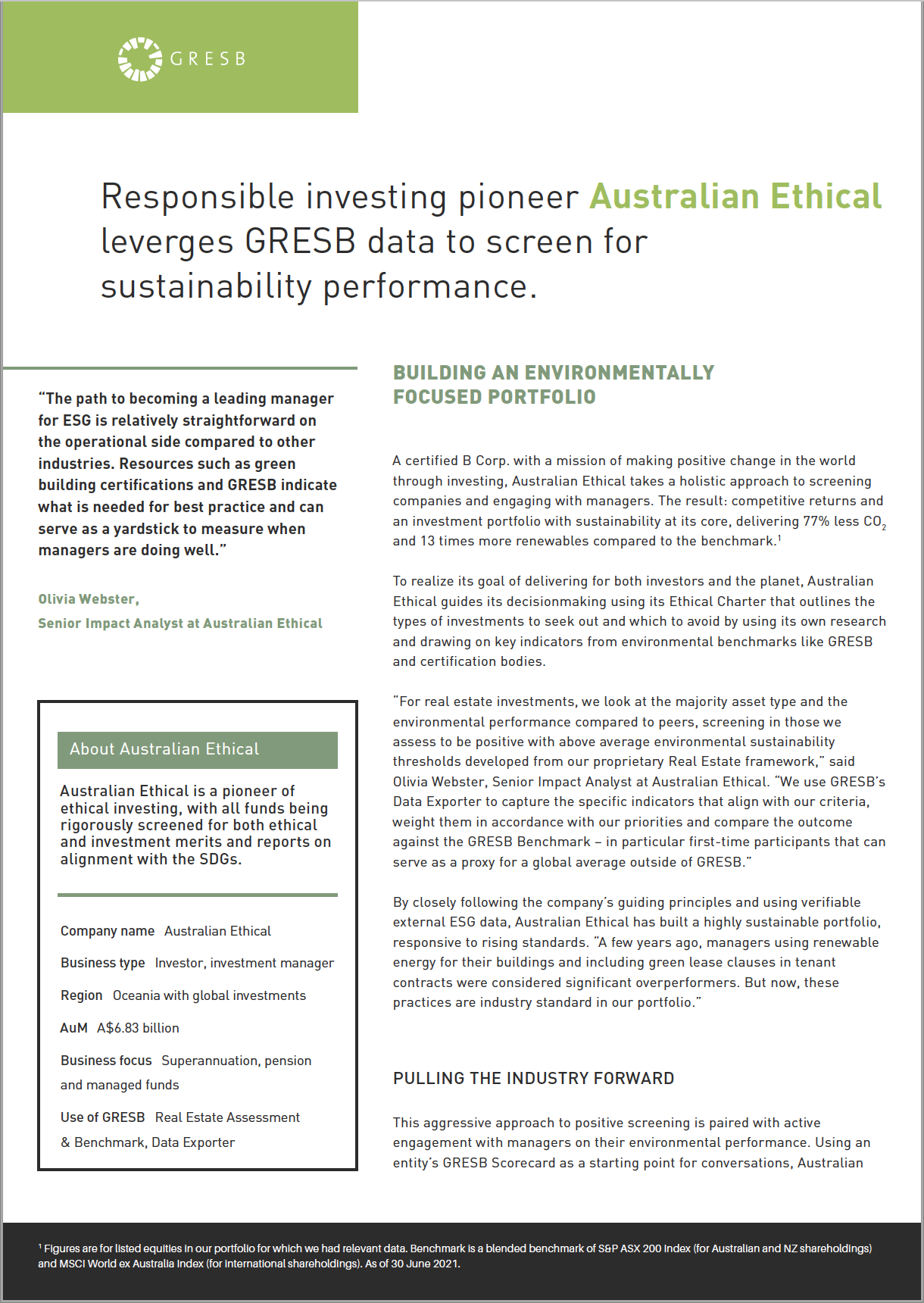Responsible investing pioneer Australian Ethical leverages GRESB data to screen for sustainability performance

Australian Ethical
Australian Ethical is a pioneer of ethical investing, with all funds being rigorously screened for both ethical and investment merits and reports on alignment with the Sustainable Development Goals.
Business type: Investor
Region: Oceania + global investments
AuM: AUD 6.83 billion
Business focus: Superannuation, pension and managed funds guided by the company’s Ethical Charter
Use of GRESB: Real Estate Assessment & Benchmark, Data Exporter
Building an environmentally focused portfolio
A certified B Corp. with a mission of making positive change in the world through investing, Australian Ethical takes a holistic approach to screening companies and engaging with managers. The result: competitive returns and an investment portfolio with sustainability at its core, delivering 77% less CO2 and 13 times more renewables compared to the benchmark.*
To realize its goal of delivering for both investors and the planet, Australian Ethical guides its decision-making using its Ethical Charter that outlines the types of investments to seek out and which to avoid by using its own research and drawing on key indicators from environmental benchmarks like GRESB and certification bodies.
“For real estate investments, we look at the majority asset type and the environmental performance compared to peers, screening in those we assess to be positive with above average environmental sustainability thresholds developed from our proprietary Real Estate framework,” said Olivia Webster, Senior Impact Analyst at Australian Ethical. “We use GRESB’s Data Exporter to capture the specific indicators that align with our criteria, weight them in accordance with our priorities and compare the outcome against the GRESB Benchmark – in particular first-time participants that can serve as a proxy for a global average outside of GRESB.”
By closely following the company’s guiding principles and using verifiable external ESG data, Australian Ethical has built a highly sustainable portfolio, responsive to rising standards. “A few years ago, managers using renewable energy for their buildings and including green lease clauses in tenant contracts were considered significant overperformers. But now, these practices are industry standard in our portfolio.”
Pulling the industry forward
This aggressive approach to positive screening is paired with active engagement with managers on their environmental performance. Using an entity’s GRESB Scorecard as a starting point for conversations, Australian Ethical engages with managers, asking them to prioritize, set, and deliver on the ambitious sustainability targets that the wider industry, particularly in Australia, is embracing.
“The path to becoming a leading manager for ESG is relatively straightforward on the operational side compared to some other industries, with resources like green building certifications and GRESB indicating what is needed for best practices,” Webster said. “This means there are fewer excuses when a real estate manager is lagging on ESG performance. Over the last financial year, we engaged with and eventually divested from two companies because of performance- and commitment-related concerns. One because its GRESB performance wasn’t meeting expectations and the other because it chose not to participate in the assessment. Despite these cases, we have been happily surprised to see the industry as a whole move towards better ESG performance in a short period of time.” Webster also noted that the path to net zero is noticeably more complex for build (embodied) emissions and that to make progress both collaboration and innovation are needed.
Looking ahead to net-positive targets and tackling embodied carbon
With its real estate portfolio already composed of stronger environmental performers compared to existing benchmarks, Australian Ethical is focused on accelerating progress across the sector. For Webster, leading managers are those that are setting and achieving ambitious net-zero and net-positive operational targets ahead of 2030 and making specific commitments to 100% renewable energy.
Emissions in the development value chain will be a major point of focus in the near future, with a special emphasis on hard-to-abate building materials such as cement and concrete. “Tackling this is critical if we are going to drive emissions from the built environment down to where they need to be,” added Webster. “It will not be easy, however, and cross-industry collaboration will be key, as material producers often claim there isn’t enough interest in low-emissions products and managers say that there are simply no low-emissions material available.”
Collaboration could include participation in groups like the Materials & Embodied Carbon Leaders’ Alliance (MECLA), which engages with producers and users of building materials to address the many barriers around low-carbon building materials on both the supply and demand side. Australian Ethical continues engaging with prospective and investible companies to encourage improvements in climate performance, along with actively participating in MECLA to help drive industry-wide outcomes and move towards Paris alignment.
*Figures are for listed equities in our portfolio for which we had relevant data. Benchmark is a blended benchmark of S&P ASX 200 Index (for Australian and NZ shareholdings) and MSCI World ex Australia Index (for international shareholdings). As of 30 June 2021.
This is general information only. Please read the Financial Services Guide, relevant Product Disclosure Statement and Target Market Determinations at australianethical.com.au to consider if Australian Ethical’s products are right for you. Australian Ethical Investment Ltd (ABN 47 003 188 930, AFSL 229949)